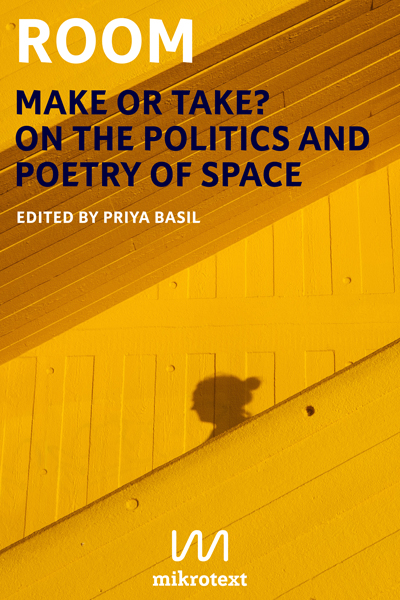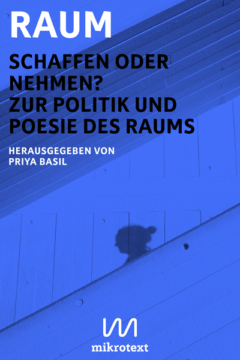Priya Basil
Room. Make or take?
On the politics and poetry of space

The German word Freiraum, literally translated, means free room. Freiraum is more than just physical space though, it is also a mental state of creativity and freedom. In 1929 Virginia Woolf argued for the necessity of a „room of one’s own“ for women writers: Freiraum, both literal and figurative, to think and to create. Almost a century later, having a private room is still a privilege, not only but especially for women. A virus knowing no boundaries or borders emphasized this inequality, making obvious the fierce competition for whose space is whose.
3,99 €
Summary
Which public does this public space belong to, what are its rules, and how are they policed? Unspoken questions that are revitalizing gated communities and exclusionary zoning around the world. Who gets to claim and define public spaces? Whose rules determine how space is used and shared? How does identity shape our experience of space?
Billy-Ray Belcourt, Besufekad, Intan Paramaditha, Adania Shibli, four international authors, have taken part in the LCB’s digital residency programme in 2021 and have discussed and explored different notions of space in conversation and in writing.
The digital residency is curated by Priya Basil and funded by the Federal Foreign Office.
Also have a look at the digital residency’s anthology edited by Natasha A. Kelly Un_Masking Difference. Literary Voices from Behind the Mask in 2020.
Launch
13 December 2021, 9 p.m.: Readings and discussions with Billy-Ray Belcourt, Intan Paramaditha and Adania Shibli. Moderation: Priya Basil. In English. LIVESTREAM at lcb.de.
Mama’s Room
By Intan Paramaditha
I remember the patient bed, blue, being moved from Mama’s room to the family room, directly across from the television and backing up against the dusty glass cabinet filled with ceramics and old, shabby, pathetic dolls. Everything was crowded together: a scratched brown leather sofa, a guest table covered with medicine bottles, vitamins, balms and a water jar, and, at bedside, a folding chair usually occupied by the nurse. Not far from the foot of the bed stood a round marble dining table, stylish during the ‘80s, but now drab. Atop the table was a blender, sometimes unwashed for several hours, its cord attached to the wall.
After changing my mother’s incontinence diaper and feeding her, the nurse would sit in the folding chair, wipe away sweat, and then, fanning herself with a thin book in her left hand, scroll up and down her cell phone with her right thumb. On Sundays, her day off, I’d sit there. The bed made everything feel that much more cramped and hot, but Mama refused to be cared for in her room.
“I don’t want to be alone, Muti,” she said.
“You won’t be alone, Mama,” I countered.
My mother insisted, so she’d lie there staring at the ceiling and listening to the television. When the nurse prepared food, I’d sit beside my mother and work with a computer perched on my lap until my thighs grew hot. Mama would comment on the news on television, and then tell me to find a channel with a soap opera, but soon she’d ask for more news, soap, news, soap, then she’d curse—damn tacky soap operas—before finally telling me to turn the TV off. I felt relieved whenever she fell asleep. I’d look at her closed eyes and her dry lips, half-open, and return to my computer screen, for just a few moments, because ten minutes later she’d open her eyes again and ask me to read from the Koran. I’d choose a verse at random and her eyes would close. After fifteen minutes she’d tire of my voice and have me find a reading of the Ayat al-Kursi on Youtube. The volume would be too low so I’d need to turn it up, but before long Mama would ask me to turn it down, up, down, up, off.
“Everything is dead,” she’d say. “But I’m not dead yet.“
(…)




